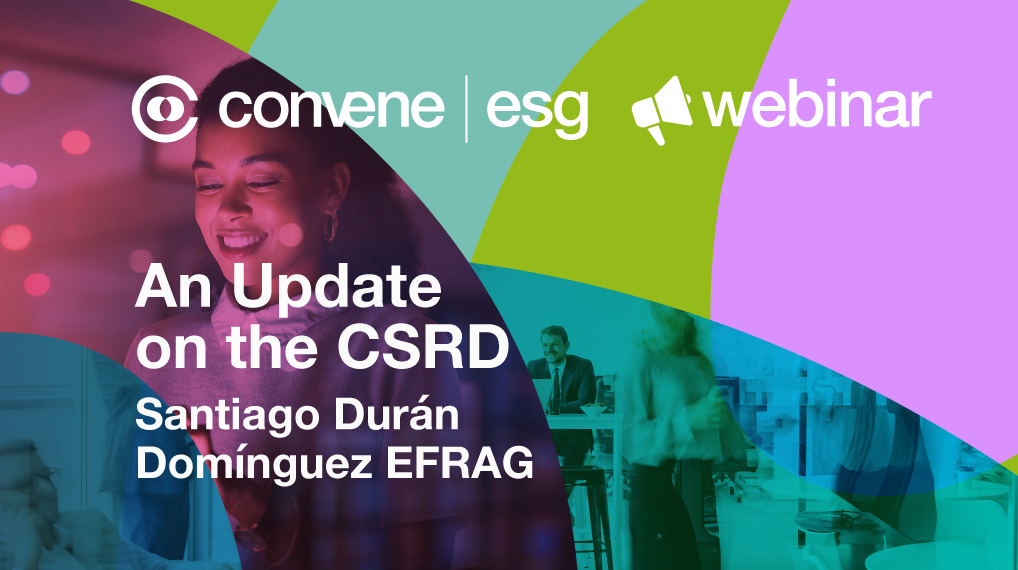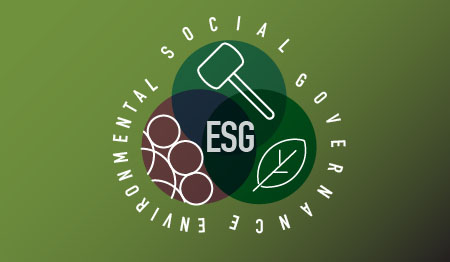In recent years, organisations have been focused on embedding sustainability into their operations. Numerous companies are restructuring their business strategies, reorganising their corporate frameworks, and investing significant resources to incorporate ESG into their objectives.
Many have come to see ESG reporting as not just a regulatory burden, but a critical part of running an organisation, and appealing to investors.
Reporting ESG performance in ESG reports is the way to demonstrate this, to investors and stakeholders alike. They have become a crucial way for organisation to show their dedication to the implementation of ESG, and are slowly becoming much more commonplace and in some sectors mandatory.
But, what even is an ESG report?
7 min read
What is an ESG Report?
By Lottie Wright on 20/06/24 11:00
Topics: Governance Sustainability ESG
3 min read
Convene Sponsors the 2024 CGI ESG Summit
By Lottie Wright on 14/05/24 14:09
On Thursday 2nd May, Convene sponsored the 2024 CGI ESG Summit. We’d like to thank the Chartered Governance Institute for such an engaging conference, and all attendees for their enthusiastic participation.
The summit was a chance to connect with industry professionals and discuss the recent developments in the fast-paced ESG landscape. As more organisations begin to incorporate ESG into their agenda, goals and objectives, understanding both ESG risks and its opportunities is crucial.
This summit focused on these ESG risks, on the increasing regulatory and market demands and what your organisation needs to do to capitalise on this momentum. It provided attendees with the latest thinking on ESG regulation, legislation and best practice for UK companies and subsidiaries.
It started with a Keynote on ‘anti-ESG’ backlash, and how companies and their investors can move forward when facing this. This was followed by a debate by ESG experts on the challenges of how to prioritise different aspects of ESG alongside company and stakeholder interests.
There was then a talk on the role of the sustainability committee, discussing what works and what doesn’t when setting up board-level sustainability committees.
This was then followed by an ESG regulation and reporting update, exploring the evolving landscape and what critical deadlines Boards should focus on amongst all of this new legislation.
There was also a panel on top tips for getting ESG reporting right, which discussed the potential issues when gathering reliable ESG data.
This is where Convene ESG comes in as a sponsor of the summit.
Convene ESG allows you to simplify your ESG reporting by providing a platform to collect data, track progress, align with frameworks and produce reports.
Our end-to-end approach simplifies and automates much of the process, and will help your organisation not only generate a report, but be able set up and track your ESG goals. Our peer comparison feature also allows you to see which disclosure items your peers have reported on, as well as the best-practice recommendations for your industry.
With Convene ESG, you can be sure that your ESG report building runs smoothly, so you can instead focus on developing your sustainable strategies.
After a break for lunch, there was a session that looked at managing ESG risks and what a Director’s duties and liabilities can be.
This was followed by a panel on Boardroom diversity, exploring the new frontiers for Board diversity and discussing how companies can continue to make their boards more diverse.
There was then a panel about ESG engagement with investors, which saw investors discussing the future of ESG from their perspective and what role ESG plays in investment decisions.
Finally, the day ended with a session that enabled attendees to identify the skill gaps in their Boardroom, and apply their ESG knowledge in practice. This looked at ‘plugging the ESG competency gap’, and helping organisations on all levels understand the importance of ESG.
The summit explored the evolving world of ESG, and helped organisations understand the sometimes overwhelming ‘alphabet soup’ of ESG legislation.
We’d like to again thank the CGI for putting on such a thought-provoking conference, as well as all those in attendance for their enlightening discussions on the developing landscape of ESG.
You can learn more about how Convene ESG can help your organisation in navigating this landscape and its regulations here.
Topics: Sustainability ESG
2 min read
Why Your ESG Report Should Be Auditable?
By Gabriella Mangham on 01/05/24 14:52
Convene ESG have recently been informed that some KPMG clients have been told to ensure their ESG reports should be auditable. Before we deep dive into why this is the case, it is important that you know Convene ESG provides a complete audit trail that is available to be exported at a moment’s notice. If you would like to learn more about Convene ESG’s extensive capabilities, please see our full features page.
Topics: Governance Sustainability ESG SRS for Social Housing Housing
2 min read
Demystifying ESG in the EU - Webinar
By Lottie Wright on 17/04/24 10:56
On the 16th April 2024, Convene hosted our second webinar in our Convene ESG series, which focused on ‘Demystifying ESG in the EU’.
The webinar featured Professor Laura Corazza, a Senior Researcher of Sustainability Accounting and Accountability at the University of Turin. In her talk and presentation she explained the new EU CSRD Regulations, before going through some practical tips on how companies can start embracing ESG principles.
Laura Corazzo first spoke about the ESG regulatory landscape, and how disclosures have transformed over the years. She looked at the international reporting landscape specifically, and explained the difference between standards and frameworks.
Laura discussed the European strategy towards sustainability with the European Green Deal, and highlighted the targets, time frames and actions of said deal.
Then Laura explored how the European ESG landscape has been transforming in recent years, starting with the European Taxonomy and its objectives. She spoke about the changes occurring to global economies including the implementation of the CSRD, the DNSH principle and the CSDDD.
She then gave some background information surrounding the CSRD, and the differences between the previous NFRD legislation and the current CSRD. The CSRD has far more detail in regards to the data that companies need to provide in their reporting.
Laura then introduced the CSRD timeline and phased implementation, noting that from January 1st 2024 reporting requirements apply to the first group of affected companies, with their reports being published in 2025. She ended the talk discussing double materiality and its logic.
To download the slides from Laura's talk, click here. Or scroll below to watch Laura's talk.
Topics: Sustainability ESG Frameworks Webinars
2 min read
An Update on the CSRD with Santiago Durán Domínguez - Webinar
By Lottie Wright on 15/03/24 09:46
On the 12th March, Convene hosted the first webinar in our Convene ESG series, explaining updates on ESG matters in the EU.
This webinar discussed an update on the CSRD, with Santiago Durán Domínguez from EFRAG. The CSRD, or Corporate Sustainability Reporting Directive, is the new EU legislation requiring companies to release regular reports on their ESG efforts.
First, the webinar started with a demo on reporting for the CSRD with Convene ESG, Convene’s own ESG reporting software. Convene ESG is an end-to-end platform to collect data, track progress, compare with peers, align with frameworks and produce ESG reports. With Convene ESG, you can collect your data for all the necessary metrics in the upcoming CSRD legislation, ensuring that you are compliant with regulations.
Then, Santiago Durán Domínguez was introduced to talk about the update to the CSRD. He discussed the sustainability information organisations should know about, and the current areas of regulatory developments; taxonomy, tools for companies and disclosure regimes.
He discussed the relevant aspects of the CSRD, and stressed the importance of the CSRD as a way for companies to all report according to European standards.
Santiago Durán Domínguez also went through the three categories of standards for the CSRD, and discussed the relevant issues of double materiality, due diligence, interoperability with other international frameworks and value chain.
He then spoke about the role of EFRAG in all of this, and the current issues of verification with the CSRD, which will instead have limited assurance until 2028. There was then a brief Q&A at the end of the session.
To download the slides from Santiago's talk, click here. Or scroll below to watch Santiago's talk.
If you enjoyed this webinar or want to catch the next one, our upcoming topic will be ‘Demystifying ESG in the EU’ on April 9th.
Thank you to all for those who attended, and to Santiago Durán Domínguez for his insights into the CSRD.
Topics: Sustainability ESG Frameworks
2 min read
Webinar: Convene ESG looks forward for 2024
By Gabriella Mangham on 20/02/24 16:26
Today Convene ESG hosted yet another successful webinar about what you can expect in the Housing ESG realm in 2024.
Topics: Sustainability ESG SRS for Social Housing Housing
3 min read
Convene sponsors the 2024 ESG and Sustainability Reporting Conference
By Lottie Wright on 07/02/24 13:48
On Tuesday 6th February 2024, Convene sponsored the ESG and Sustainability Reporting Conference in London. We’d like to thank Westminster Insight as well as all speakers and attendees for putting on such an engaging conference.
Topics: Sustainability ESG
7 min read
Does your organisation need a CSO?
By Lottie Wright on 01/02/24 11:00
When sustainability is discussed, ESG specialists usually emphasise the significance of having a committed individual responsible for overseeing initiatives. This can help to maintain and enhance sustainability across the entire organisation.
Linda Fisher was the first person to receive the title of “Chief Sustainability Officer” in 2004, when she was hired by DuPont. Following this, there has been a surge of similar positions cropping up at major companies. As of 2021 the number of CSOs worldwide has tripled, in comparison to 2016.
The duties of the CSO position have continued to evolve with the ever-changing ESG landscape. But the question is: what exactly is the role of a Chief Sustainability Officer and does your organisation need one?
The Role of the CSO
There still seems to be a lack of clarity surrounding the role of the CSO. Having a CSO doesn’t immediately guarantee company-wide sustainability. Sustainability cannot be left to just one person, or confined to one area of an organisation. It needs to be integrated throughout all levels of a company.
The role of a CSO includes overseeing risk, fostering resilience, and guiding the behaviour of stakeholders: employees, businesses, investors, governments, and regulators.
A CSO is responsible for a company’s environmental impact, resources and plans. Although environmental issues are critical to the role, there is a growing number of CSOs who are bringing the S and G aspects of ESG into the role too.
The scope of the CSOs responsibilities differs greatly across industries and organisations, depending on their significant social and environmental influence. However, their general function is to analyse potential changes in the external sustainability landscape, then assess the strategic implications for their company. They then need to help ensure that their company fulfils its environmental, social, and governance commitments.
The Responsibilities of the CSO
The specific responsibilities the CSO has in managing an organisation’s ESG and sustainability goals can include:
Ensuring regulatory compliance.
Topics: Governance Sustainability ESG Business Insights
6 min read
ESG Trends in 2024
By Lottie Wright on 15/12/23 15:25
As ESG practices and disclosures become crucial to a companies' public image, their investors and their overall success, 2024 looks to be a year of even further regulations and a ramping up of ESG policies.
Now, more than ever, it is important for organisations to prepare for ESG in 2024, and understand the trends we could be seeing in the future sustainability landscape.
But first, what was ESG like in 2023?
ESG in 2023
In 2023, organisations all over the world faced a turbulent landscape marked by a cost of living crisis, inflation, supply chain disruptions, and recessions fears. Amid this uncertainty, Environmental, Social and Governance practices became even more crucial for companies to undertake.
2023 was a turning point for ESG and emphasised the need for proactive ESG initiatives. ESG trends have been around for the past few years but there were some clear trends in 2023 that are important to remember going into 2024.
Sustainable Finance: Companies focusing on both financial revenue and the environment in their investments has gained momentum in the last year.
Supply Chain Resilience: There was a significant focus on supply chain resilience as an ESG trend. This was emphasised by the need to develop a supply chain that can maintain its efficiency in times of crisis, for example in a global pandemic.
Transparency and Ethical Practices: In order to steer clear of greenwashing accusations companies are putting in more effort to promote transparency and prioritise ethical business and governance practices.
The ESG landscape is continuing to evolve. With ESG maintaining its priority on the agenda, it is important for organisations to understand what is in store for the future of ESG, and what trends might be seen in 2024.
ESG Trends in 2024
Heading into 2024, there are both old and new ESG trends to be mindful of, especially for companies seeking to implement greater sustainability.
It is already shaping up to be a watermark year for ESG regulation with years of preparation finally ramping into action. This is particularly true in the EU, where the emphasis is now shifting to implementation after the introduction of numerous regulations over the last three years.
Here are the top trends to watch out for in 2024.
Topics: Sustainability ESG Business Insights
6 min read
What to Prepare for 2024: Housing ESG
By Lottie Wright on 01/12/23 10:30
With the increasing focus on ESG in recent years, it's important to feel prepared for what this changing landscape can bring in the future.
For Housing Associations, the Prime Minister’s announcement of a policy overhaul on plans to help cut carbon emissions left the sector in limbo, and the recent appointment of a new housing minister, the 7th since the beginning of 2022, means that regaining a sense of stability is more critical than ever.
Staying ahead of trends, pushing ESG discussions forward and focusing on developing an effective reporting cycle will be crucial in helping Housing Associations feel secure in the face of future uncertainty.
Housing Associations need to be on top of their ESG reporting, and this includes choosing the right framework and solutions for your organisation.
Topics: Sustainability ESG Housing Frameworks
6 min read
What is the ISSB?
By Lottie Wright on 25/10/23 13:24
The International Sustainability Standards Board (ISSB) standards are set to become effective starting January 1, 2024. These new standards are a significant step forward for sustainability reporting. They will have a major impact on the way companies disclose their ESG (Environmental, Social, Governance) initiatives.
One major challenge that companies face when it comes to ESG reporting is the lack of standardisation.
There is currently a lot of freedom in what companies can disclose, because there is no global standard for reporting. As a result, they have the ability to present reports in a way that benefits them the most. This not only lacks scientific validity but also opens the door to greenwashing.
The ISSB standards are intended to be the foundation for a comprehensive global baseline of sustainability disclosures. They are specifically focused on the needs of investors and the financial markets — something investors have long desired.
So, what do you need to know about this next phase of evolution in ESG reporting?
What is the ISSB?
The International Sustainability Standards Board (ISSB) is an independent, private-sector body that develops and approves IFRS Sustainability Disclosure Standards. The ISSB operates under the oversight of the IFRS Foundation.
Today, economic and investment decisions are increasingly incorporating sustainability information. In response to this, the IFRS Foundation created the ISSB as a sister board to the IASB in 2021. The ISSB provides a global baseline of sustainability disclosures to further inform economic and investment decisions.
There are two sets of proposed standards under the ISSB – sustainability related disclosures and climate disclosures. Both of these are structured around the four pillars outlined by the TCFD: governance, strategy, risk management, metrics and targets.
General sustainability disclosures:
The ISSB extends the framework established by the Task Force on Climate-related Financial Disclosures (TCFD). This means the framework now encompasses non-climate-related sustainability issues. Additionally, these standards outline intentions to disclose all potential risks and opportunities relating to sustainability matters.
Climate disclosure standards:
These standards are primarily focused on climate-related aspects, aligning with the TCFD approach. They tackle important factors including potential risks to the environment, climate resilience, greenhouse gas emissions, and carbon footprint.
The governance and risk management pillars of the ISSB are closely aligned with the TCFD's recommendations. However, this new standard calls for further information and more details on strategy, metrics and targets.
After extensive consultation and feedback since the start of the standards’ development, and with the two proposed standards having been announced, the ISSB will come into force in January 2024 for the subsequent reporting year.
What is the ISSB’s purpose?
Given the number of ESG standards that already exist, it might leave companies wondering what the ISSB is even supposed to achieve.
The ISSB is designed to address this developing disclosure fatigue. By continuing a process of consolidation in sustainability standards, it seeks to create a global standard for ESG reporting.
The ISSB has set out four objectives:
Topics: Governance Sustainability ESG Frameworks
4 min read
Convene ESG Hears From Experts At Networking Event
By Gabriella Mangham on 18/10/23 10:03
Last week Convene ESG hosted another networking event for Housing ESG professionals. We had many interesting discussions during the cocktail hour about how best to approach ESG as an organisation. A common topic was how Housing Associations are working to embed a culture of ESG in their day-to-day activities.
Topics: Sustainability ESG SRS for Social Housing Housing
7 min read
Housing Insight: Why ESG Reports Matter
By Lottie Wright on 29/09/23 14:28
On the 20th September, Prime Minister Rishi Sunak announced an overhaul of policies intended to help the UK meet its target of cutting carbon emissions to net zero by 2050.
The prime minister said the UK could afford to adopt a more “pragmatic, proportionate and realistic” approach to achieving net zero.
This policy overhaul from the government leaves Housing Associations in limbo. It is unclear how the Sector should move forward with sustainability and decarbonisation plans.
This means it is more important than ever for Housing to be on top of their ESG reports, as it provides something to rely on in the face of uncertainty.
But what exactly did the Prime Minister’s announcement say, and what does this mean for Housing Associations moving forward?
What did Rishi Sunak’s announcement say?
The Prime Minister announced that targets to get households to switch away from fossil fuel boilers were being relaxed. Alongside this, he announced plans for tougher energy efficiency rules for landlords were being ditched. He also declared the ban on the sales of new petrol and diesel cars was being pushed back, from 2030 to 2035.
Three years ago the government set out its “preferred policy scenario” of all private landlords achieving Energy Performance Certificate rating C. For new tenancies this was from 2025, and for existing tenants it was by 2028.
Tenant bodies are outraged by the abandonment of this policy, amid concerns that the much-awaited Renters Reform Bill might face a similar fate.
Sunak claimed he would still “encourage” households to improve their energy efficiency, but that “under current plans, some property owners would have been forced to make expensive upgrades in just two years’ time”.
Additionally, the Prime Minister declared a 50% increase in financial support for grants under the government's boiler upgrade scheme. He said he does not want to impose costs on “hard-pressed families” at a time “when technology is often still expensive”.
While this might sound appealing, the 2035 deadline for putting in new boilers remains unchanged. The only new policy being the promise of an exemption for those who would find the switch to heat pumps the “hardest”.
The Prime Minister said this overhaul “doesn’t mean” he is “any less committed to decarbonising our homes”.
A significant portion of these changes will affect the Housing industry in one way or another. This Sector was already making progress towards the country's net zero goals by enhancing the energy efficiency of many homes, as well as starting to report on ESG through the SRS.
The changes leave many Housing Associations uncertain on how to proceed, as the details of what this means for the Sector has not been made clear by the government.
What is the response from the Housing Sector?
The potential impact of these changes for Housing Associations cannot be ignored. Many in the industry have already come out to share their thoughts on the upcoming changes and what they could mean for the Sector.
Kate Henderson, chief executive of the National Housing Federation, said it is “hugely disappointing” to see the government “row back from its commitments to net zero, particularly on improving the energy efficiency of our homes”.
She stated: “England’s homes are among the oldest and draughtiest in Europe. Making homes more energy efficient is a win-win, not only helping to save our planet, but also boosting our economy by creating jobs and, crucially, saving money.”
Rachelle Earwaker, senior economist at the Joseph Rowntree Foundation, said easing the regulations on energy-efficient homes is “ill advised and ill considered”.
She added: “If we don’t invest in energy-efficient housing and more sustainable and affordable energy solutions, the only certainty is frighteningly high energy bills and poor health outcomes.”
Dan Wilson Craw, deputy chief executive of Generation Rent, said scrapping higher standards for rental properties is a “colossal error” by the government, and that “energy efficiency” is an “essential part of a home’s quality”.
He stated that abandoning these policies is “both cruel and out of proportion to what the prime minister wants to achieve.”
What does this mean for Housing Associations?
Overall, this presents a huge problem for the Sector, which was already challenged with the enormous responsibility of reducing carbon emissions. Now, the industry is confronted with even more uncertainty regarding the government's objectives.
There are also significantly diminished prospects of securing the necessary funding to aid in decarbonisation.
Rishi Sunak and the government have promised a “pragmatic” transition in which the public continues to rely on gas boilers, ignore the issue of energy inefficient housing, delay the serious adoption of electric vehicles until 2035, and somehow, miraculously, achieve the significant reductions in carbon dioxide emissions necessary to achieve net zero.
The lack of clarity on how to move forward with sustainability plans, and how to give tenants the best quality service possible in spite of government policy, means a challenging road ahead.
All this highlights is that it is more important than ever for Housing Associations to communicate with their tenants, and assure them that their needs are your top priority.
The Sector needs to be able to ensure their environmental efforts are being demonstrated, and the public is made aware of them. Whether this be in energy efficiency and ESG goals or beyond, communication between Housing providers and tenants is crucial.
Additionally, with the possibility of more funding from the government appearing more and more unlikely, financing for Housing Associations is going to become more and more competitive.
With investors and consumers alike focusing on sustainability and ESG, reporting effectively and clearly, and showing your environmental progress is going to be critical in the face of these changes.
The earlier you start reporting, the more secure you can be in the face of instability within the Sector.
Why ESG Reports are more important than ever?
As well as achieving its target of net zero emissions by 2050, the UK government has to meet interim “budgets” along the way. Ministers have yet to flesh out important details of Sunak’s policy changes — such as exactly which households might be exempt from having to ditch fossil fuel boilers — so the impact on emissions is hard to calculate at this stage.
Moving forward, the Sector should continue to strive towards sustainability, and this means focusing on what you can do; ESG reporting, and the SRS.
Publishing an ESG report sets out your clear intentions for your organisation’s future, and its future projects. It includes your current investments and future investments into ESG. This will allow your potential investors to have a complete idea of how their money will be spent.
These announcements may make it seem like ESG should be less of a concern for the Housing Sector. The targets proposed by the government are unclear, and the elections next year may mean that it will all change yet again anyway! However, the Housing Sector has always pushed to be ahead of the curve, when government regulations are lacking, it is up to Housing Associations to provide the best service possible for their tenants.
Furthermore, investors, banks and loan providers will still be focused on providing green loans and ESG funding to Housing Associations. However, access to this money will be increasingly competitive without potential government assistance. The sooner you start reporting the more evidence you will have to provide investors of your year-by-year progress.
The SRS will also soon be launching their Version 2.0. which will address some of the common concerns that investors have. This will also help push the Sector forwards. During these uncertain times it is better to be ambitious than “realistic”, especially with the upcoming changes to the SRS allowing for a “comply or explain” approach.
The SRS helps level the playing field for all Housing Associations in terms of ESG by giving a criteria for them to focus on. Organising a standard allows the whole Sector to come together to determine what matters to them around the E, the S and the G in ESG.
The Housing Sector is one of the nations’ biggest polluters; if Net Zero is to ever be achieved then it is necessary to act sooner rather than later.
How Convene can help you with ESG Reporting
Here at Convene we have developed our own ESG reporting tool: Convene ESG.
Convene ESG is designed for Housing Associations with the assistance of Housing Associations. Our Early Adopters discussed with us what they needed, and with their requirements we developed a tool that would help Housing Associations generate the best ESG reports possible.
With Convene ESG you can compare benchmarks, organise your report, assign sections, automate reminders and input your ESG data and the solution will create a report ready to publish or edit as necessary. You can also input the data once and report against multiple different frameworks. This means you can provide lenders and your tenants with both a TCFD, RITTERWALD and SRS Report without repeating the work every time!
With the SRS Version 2.0 coming out this week, it’s as good a time as any to start ESG reporting.
This updated version has been produced using feedback from Adopters, Endorsers, and supporters of the Standard, and should help your association even further on your ESG journey.
You can find more about how Convene ESG can help your Housing Association here, or you can keep up with our dedicated events including networking opportunities and webinars here.
Topics: Sustainability ESG SRS for Social Housing Housing
4 min read
What are the current ESG Regulations in the UK?
By Lottie Wright on 27/09/23 16:02
In recent years, a growing number of ESG (environmental, social, and governance) regulations have been passed around the globe.
More and more companies are being asked by investors to disclose their data, and more regulations are coming in full force. For institutions in the UK, it seems as if mandatory disclosures are just around the corner.
It is important to understand how regulations could affect your business, and to be prepared to start collecting, analysing and reporting on your ESG practices.
What are ESG Regulations?
ESG regulations are a set of requirements placed on an organisation to publicly disclose information about their ESG performance.
Although environmental, social, and governance (ESG) concerns have recently become a focus, the regulation surrounding these matters is even more current. Adhering to ever-changing regulations poses a difficulty, particularly for organisations in the early stages of developing their ESG reporting initiatives.
ESG regulations vary by country, and staying informed, as well as compliant, of these differences is crucial for companies doing business abroad.
The repercussions of non-compliance can be staggering. This can include large fines, a loss of public trust through poor publicity and, ultimately, an impact on revenue. It’s time to start understanding how ESG regulations might affect your organisation.
What are the current UK regulations?
At present, the UK has no single ESG law or regulation. The UK’s ESG policy consists of domestic and EU-derived laws and regulations, many of which are not ESG-focused.
However, one key regulation for ESG disclosures in the UK that does exist is the Companies Act. It includes requirements for annual reporting, and this applies to larger companies that are listed, have more than 500 employees or exceed £500 million in annual turnover.
Non-financial information has always been a requirement of these reports but the Act was extended in 2022 to include sustainability details. Large UK companies are now required to report on energy usage and carbon emissions as part of their annual reports.
Some sectors and organisations of a certain size now have standards they may have to report against. For example, the Housing sector has the Sustainability Reporting Standard, which whilst currently optional is paving the way for industries to specialise and standardise their ESG Reports.
Additionally, starting in 2023, ESG reporting in the UK will be further defined through Sustainability Disclosure Requirements (SDRs). The SDRs offer a framework for companies to handle sustainability opportunities, potential risks, and effects, while also establishing measurable goals and objectives.
While the SDRs are rolled out over the next two years, fully mandatory disclosure is expected by 2025.
For financial years starting after 6 April 2022, TCFD based reporting will be mandated for more than 1,300 of the largest UK-registered companies and financial institutions.
This encompasses numerous major publicly traded corporations, financial institutions, and insurance companies in the UK. Additionally, sizeable private companies are also subject to the new regulations.
New legislation affects not just large companies and institutions in the UK, but also the businesses that are in their supply chains. This emphasises the need to start reporting on ESG matters, regardless of whether you are directly impacted or not.
What are the future ESG Regulations?
Other developments in ESG reporting expected over the coming year include a mandatory requirement for certain companies to publish "net zero transition plans". These should outline how they will adapt as the UK moves towards a low carbon economy by 2050.
It is also worth noting that European corporate sustainability reporting requirements may well impact non-EU companies in the future. If they have significant EU activity or fall within the value chain of an in-scope EU company, they could be affected.
The new CSRD requirements mandate that both private and public EU companies provide detailed information on sustainability-related issues. This also applies to any non-EU companies with a substantial presence in Europe.
The International Sustainability Standards Board (ISSB) released its exposure drafts on 31 March 2022 with comments to be received by 29 July 2022. The proposed guidelines establish the criteria for disclosing information on climate and overall ESG reporting. They are likely to be implemented into UK legislation by 2024 or 2025.
While ESG reporting requirements are rapidly expanding, these regulations mostly build on existing reporting frameworks, such as the TCFD.
Although not all companies are subject to these regulations, there is a growing demand from investors for reporting. Therefore, businesses can anticipate this evolving scenario by embracing the best practices of ESG reporting without delay.
How Convene Can Help With Your ESG Reporting
Here at Convene we have developed our own ESG reporting tool: Convene ESG.
Our aim is to alleviate some of the challenges of ESG data gathering, performance tracking, and reporting for ESG factors so organisations can move towards global sustainability and net zero.
Designed in collaboration with our clients, Convene makes reporting simple, so you can focus on developing sustainable strategies.
Convene ESG can help you report on a range of existing standards including the TCFD, GRI, SRS, amongst a range of others.
It also has a built-in comparison feature, which allows you to compare against competitors' formatting of their publicly accessible reports. This will help your organisation develop the best results possible.
It's important to understand the ESG landscape and its regulations, even before these regulations are mandatory, so you can be prepared to face ESG disclosures head on. It helps not only your organisation, but the planet, to focus on how you can improve ESG practices.
Topics: Governance Sustainability ESG Frameworks
5 min read
What is Net Zero, and how does ESG factor in?
By Lottie Wright on 27/09/23 16:00
As climate change becomes a more and more pressing issue, the phrase 'Net Zero' comes up increasingly often. In 2019, the UK Government committed to achieving this target by 2050.
Net Zero means there is an equal balance of carbon going in and out of the atmosphere. Many institutions globally have come to view this as the standard for measuring their commitment to climate goals.
Sustainability has become not just an important plan, but a vital goal and mission for organisations. With ESG initiatives driving changes, the concept of carbon neutrality and net zero is becoming more of a reality.
What Does Net Zero Mean?
Net Zero means the balance of carbon going in and out of the atmosphere. It also refers to the global target of negating the amount of greenhouse gases created by human activity.
Net Zero can be achieved through reducing emissions and absorbing existing carbon dioxide out of the atmosphere, but this is no small feat.
Net Zero doesn't mean an organisation is not releasing any carbon into the atmosphere. It only means that the carbon they emit is balanced by the carbon they take out of the atmosphere. As a result, Net Zero strategies involve measures that reduce this carbon such as planting trees or reducing carbon footprint.
Global warming and climate change will have an impact across every industry. Reducing the amount of damage done to the environment is not only an ethical issue, but a practical one.
Committing to Net Zero is one of the most significant steps an organisation can take in protecting themselves in the future.
How Does ESG Contribute To Net Zero?
ESG, or Environmental, Social and Governance, is a metric used to evaluate organisations on their sustainability efforts. It is becoming an increasingly important aspect of business to investors, as concerns about climate change rise.
Environmental, the E in ESG, refers to the impact an organisation makes on climate change through its greenhouse gas emissions, waste management and energy efficiency.
Social, the S in ESG, refers to human rights, labour standards and issues such as workplace safety and security.
Governance, the G in ESG, refers to the system used to define rights, expectations, and responsibilities between different stakeholders, as well as the rules and policies in place to ensure this standard of behaviour.
With sustainability surfacing as a global objective, many investors are demanding ESG plans that outline a path to meeting net-zero carbon emission targets. ESG plans and policies help to navigate a way to net zero. They set crucial targets and hold institutions to sustainability standards.
What Can Your Organisation Do To Help Achieve Net Zero?
Reducing the dependency and use of fossil fuels can help organisations achieve those important ESG goals like Net Zero. Still, it can be more complex than simply switching to renewable energy.
No matter the challenge, reaching Net Zero emissions goals comes down to gathering and understanding the data.
In order to reach Net Zero, it is crucial for organisations to monitor and evaluate all carbon-emitting assets. Without this data, it is impossible to efficiently control energy usage and environmental footprint.
This is where ESG comes in as a helpful solution. ESG reports are designed to provide your organisation with the information and data about its environmental impact. This can then help you come up with the right strategy and plan to reach your net zero goals.















